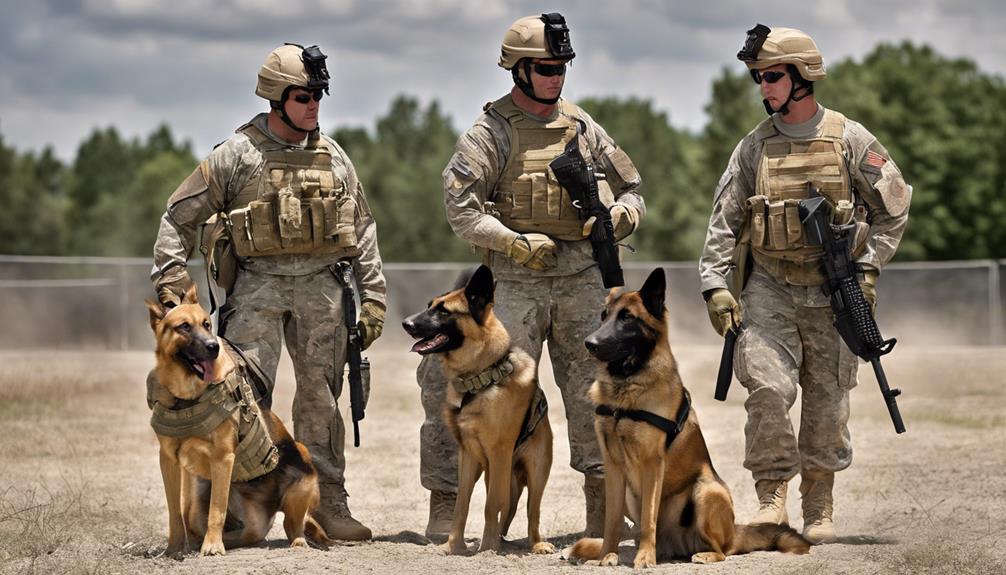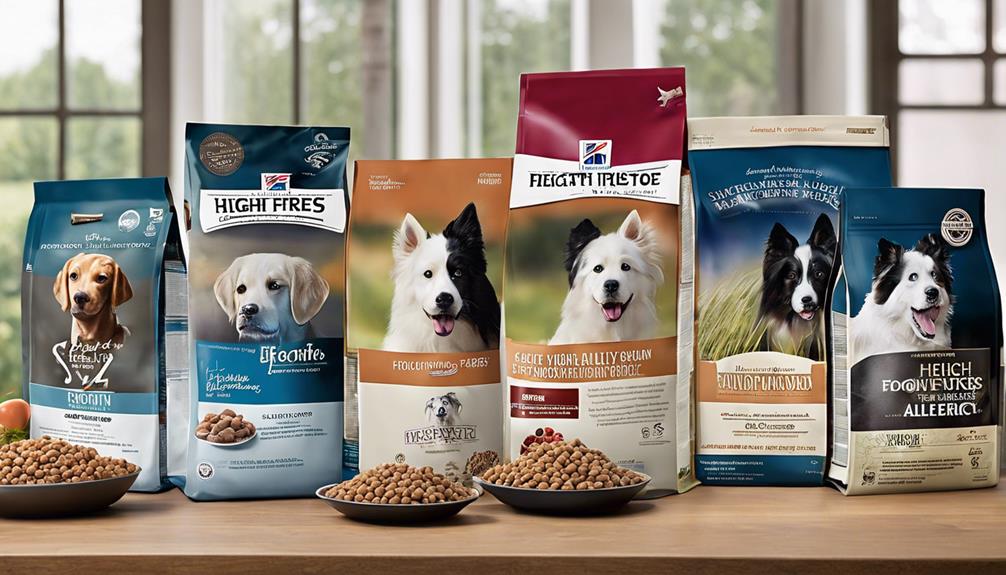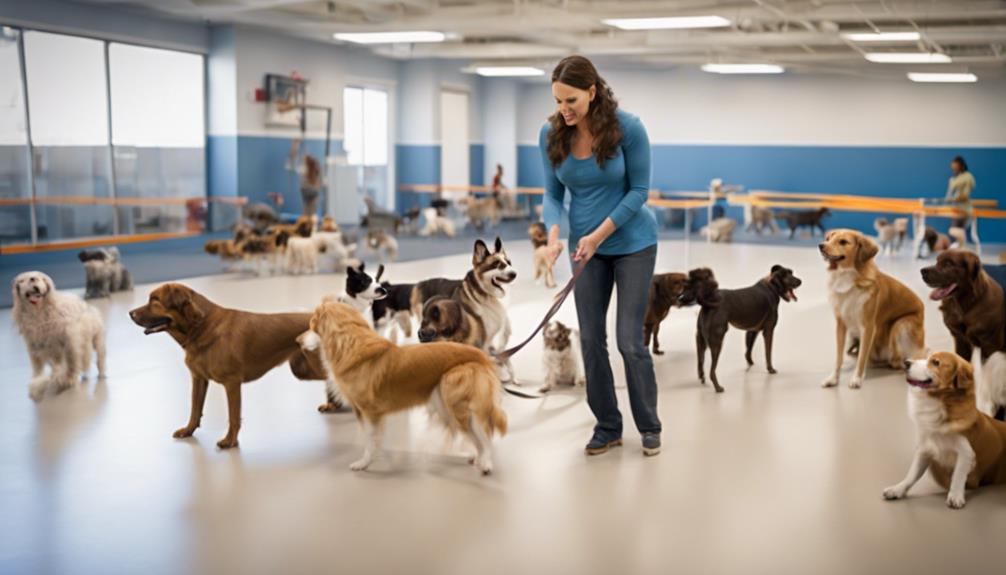As we explore the various duties of army dog training roles, we discover the specialized skills and expertise required in each area. Whether it’s training dogs to sniff out explosives or drugs, or teaching them advanced tactics for tactical operations, each role is essential in improving the abilities of military working dogs. Additionally, positions like Canine Health and Wellness Specialist underscore the importance of maintaining the physical and mental well-being of these canine soldiers to ensure top performance in the field. The wide range of opportunities in army dog training emphasizes the importance of this profession in protecting military personnel and enhancing national security.
Key Takeaways
- Explosive Detection Dog Training: Train dogs to detect explosives accurately and reliably using positive reinforcement techniques.
- Behavior and Performance Enhancement: Analyze and modify dog behavior to enhance military working dogs' performance.
- Tactical Operations Training: Train dogs for specific tactical operations to ensure prompt threat detection.
- Search and Rescue Techniques: Utilize advanced tracking techniques and positive reinforcement training for search and rescue missions.
- Narcotics Detection Training: Collaborate closely with canine partners to train and deploy dogs efficiently in combating drug trafficking.
Explosive Detection Dog Trainer
Explosive Detection Dog Trainers meticulously train canines to accurately detect explosives, guaranteeing utmost safety in diverse operational settings. As Military Working Dog Handlers, we comprehend the critical nature of our role in training Military Working Dogs to search for both narcotic drugs and explosives. Our training methods are finely tuned to enhance the dogs' abilities in detecting these threats with precision and speed. By utilizing positive reinforcement techniques and scent detection training, we instill in our canine partners the skills needed to identify explosive materials effectively.
In collaboration with military personnel, we simulate real-world scenarios to prepare our dogs for missions where their keen sense of smell can make a life-saving difference. Our focus lies in achieving the highest level of accuracy, speed, and reliability in detecting explosive substances. Through our dedication to rigorous training standards, we make certain that our dogs are well-prepared to detect and alert to potential dangers, thereby maintaining the safety and security of our operational environments.
Canine Behavior Specialist
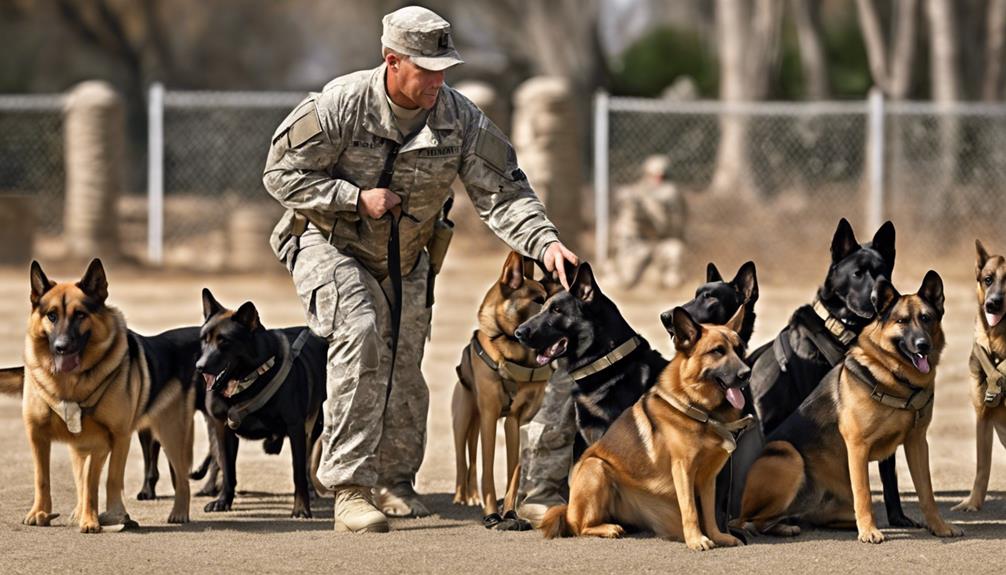
Drawing on our extensive knowledge of canine behavior, we specialize in analyzing and modifying dog behavior to optimize training outcomes for military working dogs. Canine Behavior Specialists play an essential role in enhancing the performance of military working dogs through targeted behavior modification techniques. By applying scientific principles and utilizing effective training methodologies, we address specific issues that may impede a dog's ability to excel in roles such as detection, patrol, and combat support. Our job involves closely collaborating with handlers to make sure that the dogs are adequately prepared for their duties. The table below highlights key aspects of the Canine Behavior Specialist role in training military working dogs:
| Key Aspects | Description | Importance |
|---|---|---|
| Analyzing Behavior | Utilizing behavioral analysis to understand and address issues in military working dogs | Enhances training outcomes |
| Modifying Behavior | Implementing behavior modification techniques to improve the performance of the dogs | Optimizes working capabilities |
| Working with Handlers | Collaborating with handlers to tailor training programs and ensure effective communication | Enhances handler-dog teamwork |
Tactical K9 Unit Trainer
Utilizing our expertise in training military working dogs for specific tactical operations, Tactical K9 Unit Trainers focus on enhancing the dogs' abilities to detect explosives, narcotics, and threats in high-risk environments. Our role is pivotal in shaping these K9s into proficient assets capable of safeguarding personnel and securing areas effectively. Here are key aspects of our training approach:
- Implementing specialized techniques to refine the dogs' skills in detecting explosives and narcotic drugs.
- Conducting rigorous search and find exercises to simulate real-life scenarios and enhance the dogs' mission readiness.
- Training the dogs to respond swiftly to threats, ensuring prompt and accurate threat detection.
- Collaborating closely with handlers to optimize communication and coordination during operations.
- Continuously refining training methods to adapt to evolving threats and maintain peak performance in critical missions.
Through meticulous training and dedication, Tactical K9 Unit Trainers play an essential role in preparing these K9 teams for the challenges they may face, ultimately contributing to the success of high-stakes missions.
Search and Rescue Dog Handler
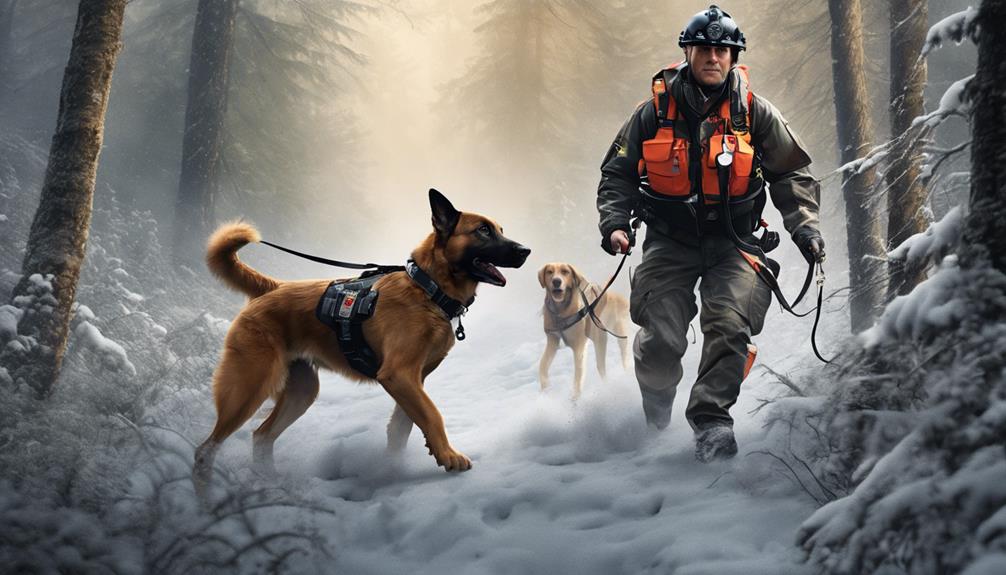
When training search and rescue dogs, we focus on utilizing advanced techniques to enhance their tracking and alert capabilities.
Our rigorous physical fitness requirements guarantee that handlers can keep up with the demanding tasks involved in search and rescue operations.
Training Techniques Utilized
Search and rescue dog handlers employ positive reinforcement training techniques to equip their canine partners with the skills needed to locate missing individuals in diverse environments.
- Scent Detection Training: Dogs are trained to identify and locate specific scents related to missing persons.
- Agility Exercises: Enhancing the dog's physical abilities to navigate various terrains quickly and efficiently.
- Obedience Training: Teaching dogs to respond promptly to commands during search and rescue operations.
- Positive Reinforcement: Rewarding desired behaviors with treats, toys, or playtime to motivate the dog.
- Handler-Dog Relationship: Building a strong bond between handler and dog to effectively communicate and work as a cohesive team during missions.
Physical Fitness Requirements
Ensuring peak physical condition is a fundamental requirement for Search and Rescue Dog Handlers, essential to their operational readiness and effectiveness in fulfilling their duties.
Meeting the Army Combat Fitness Test (ACFT) standards multiple times a year is imperative. Handlers must adhere to height and weight standards to optimize their performance in search and rescue missions.
Maintaining high physical fitness levels is crucial for Handlers to effectively support operations. The ACFT assesses the physical abilities of Handlers, ensuring they can handle the job's demands.
Physical fitness is a cornerstone of success for Search and Rescue Dog Handlers, directly impacting their ability to excel in their roles and contribute significantly to mission outcomes.
Military Working Dog Instructor
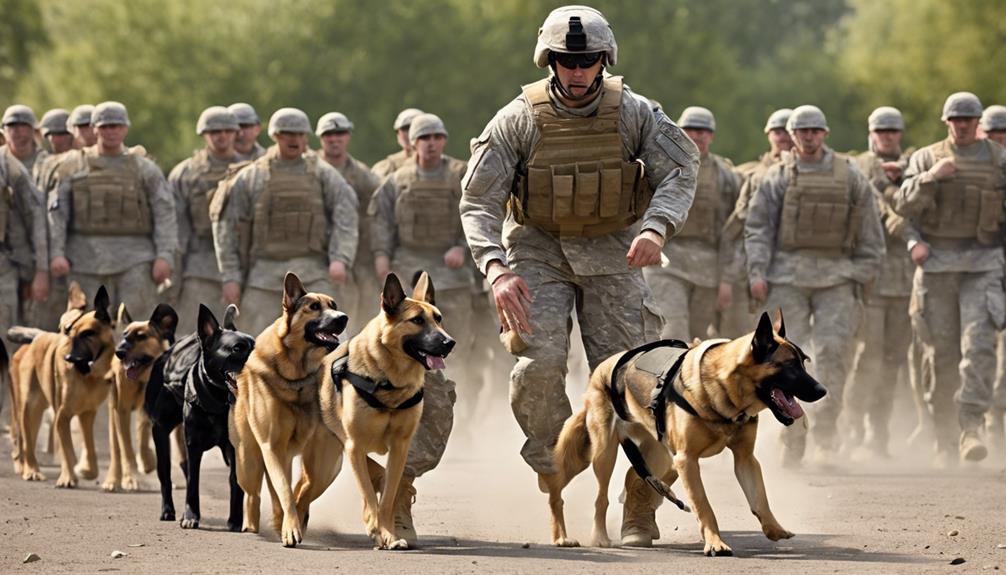
Military Working Dog Instructors meticulously train K-9 units to excel in specialized tasks important for mission success and law enforcement operations. These skilled professionals play a critical role in preparing dogs for the challenging responsibilities they'll face in the field.
Here are five key aspects of the Military Working Dog Instructor role:
- Specialized Training: Instructors focus on teaching K-9 units how to detect narcotics, explosives, and other threats, ensuring they're well-prepared for their duties.
- Mission Support: By honing the detection skills of the dogs, Instructors directly contribute to the success of missions and law enforcement operations.
- Obedience Emphasis: Training programs emphasize obedience training to make certain that the dogs can follow commands reliably in high-pressure situations.
- Detection Skills: Instructors work on developing the dogs' abilities to detect specific scents accurately and efficiently.
- Expertise Required: This role demands a deep understanding of canine behavior and advanced training techniques to bring out the best in the K-9 units.
Obedience Training Supervisor
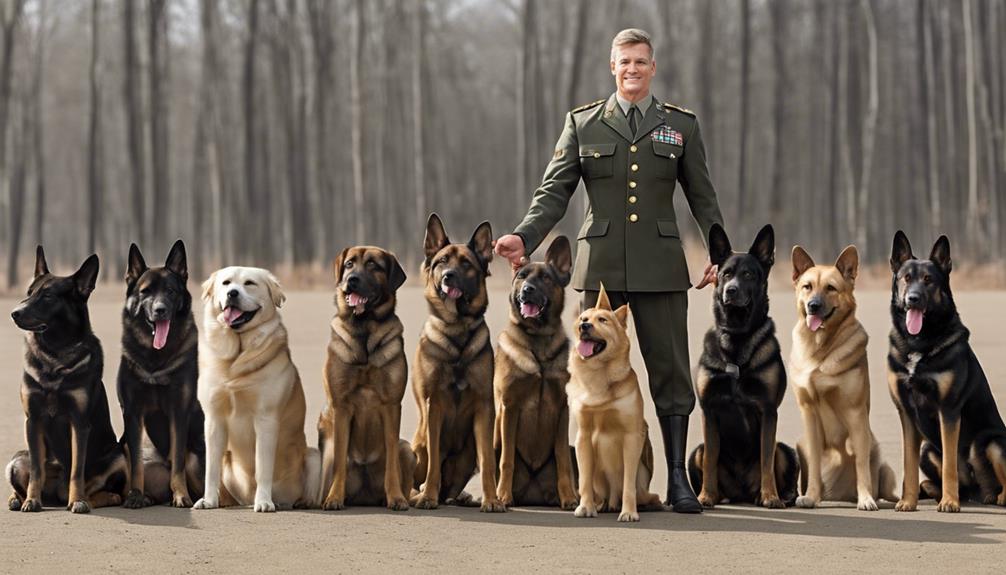
Supervisors overseeing obedience training for military working dogs play an essential role in shaping the dogs' responsiveness to commands essential for mission readiness and success. Obedience Training Supervisors are responsible for making sure that the dogs respond promptly and accurately to obedience commands, laying the foundation for successful mission outcomes.
By utilizing positive reinforcement techniques, these supervisors reinforce desired behaviors in the dogs, creating a strong bond between handler and canine. Their expertise is vital in preparing the dogs for a variety of tasks such as patrol, detection, and apprehension, contributing greatly to the overall effectiveness of the canine unit.
Working closely with handlers, Obedience Training Supervisors maintain high standards of training and performance, constantly aiming for excellence in the dogs' obedience and responsiveness. Their attention to detail and dedication to training ensure that military working dogs are well-equipped to carry out their duties with precision and reliability.
Tracking and Patrol Dog Trainer
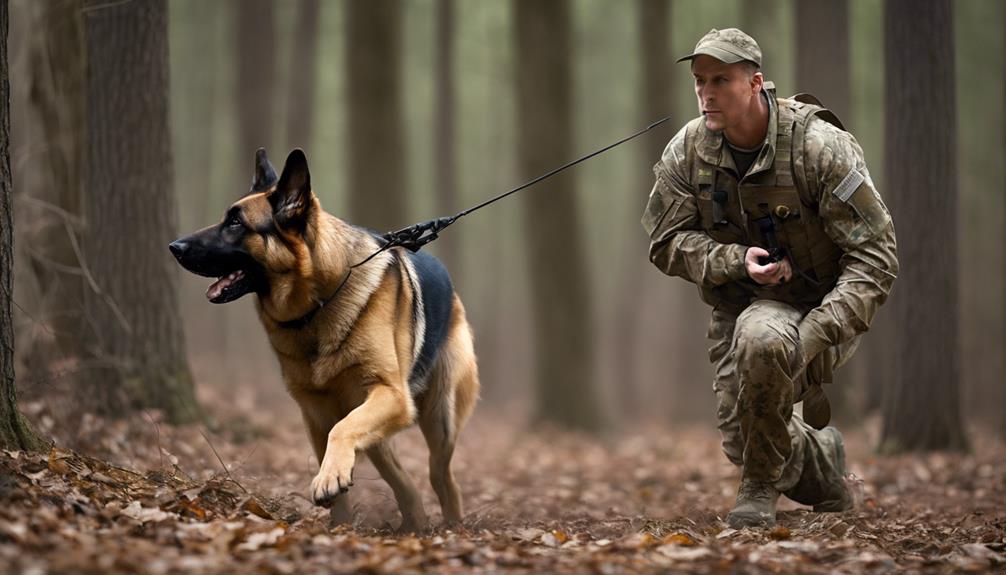
As Tracking and Patrol Dog Trainers, we employ specialized techniques to guarantee dogs are mission-ready for tactical operations.
We focus on training dogs to track scents and footsteps using positive reinforcement.
Our expertise lies in teaching dogs to follow trails, maintain focus, and alert handlers to potential threats.
Specialized Training Techniques
Employing advanced scent detection methods, we hone the skills of tracking and patrol dogs to excel in locating targets or suspects efficiently. Specialized training techniques for tracking and patrol dogs are essential in law enforcement and military operations.
Here are key aspects of our training approach:
- Teaching dogs to follow scents effectively
- Training dogs to track movements accurately
- Maintaining focus during search operations
- Using positive reinforcement to encourage desired behaviors
- Emphasizing obedience, agility, and responsiveness
Through these methods, we prepare our canine companions to be valuable assets in challenging environments, ensuring they're ready to fulfill their roles with precision and dedication.
Tactical Mission Readiness
In preparing tracking and patrol dogs for tactical missions, our focus sharpens on optimizing their detection abilities and readiness for operational tasks. Our training methods are meticulously designed to enhance the dogs' tracking skills and guarantee they are well-prepared for any threats they may encounter during tactical operations. As tracking and patrol dog trainers, we play a vital role in teaching these dogs how to locate targets, individuals, or objects efficiently in the field. Our mission is to secure the effectiveness and efficiency of military working dogs in carrying out their tracking and patrol duties.
| Training Methods | Mission Readiness Goals |
|---|---|
| Scent Detection Training | Enhancing detection abilities |
| Aggression Control Techniques | Ensuring controlled responses |
| Obedience Training | Maintaining discipline in operations |
| Scenario-based Exercises | Preparing for real-life situations |
| Continual Assessment | Monitoring progress and improvement |
Narcotics Detection Canine Handler
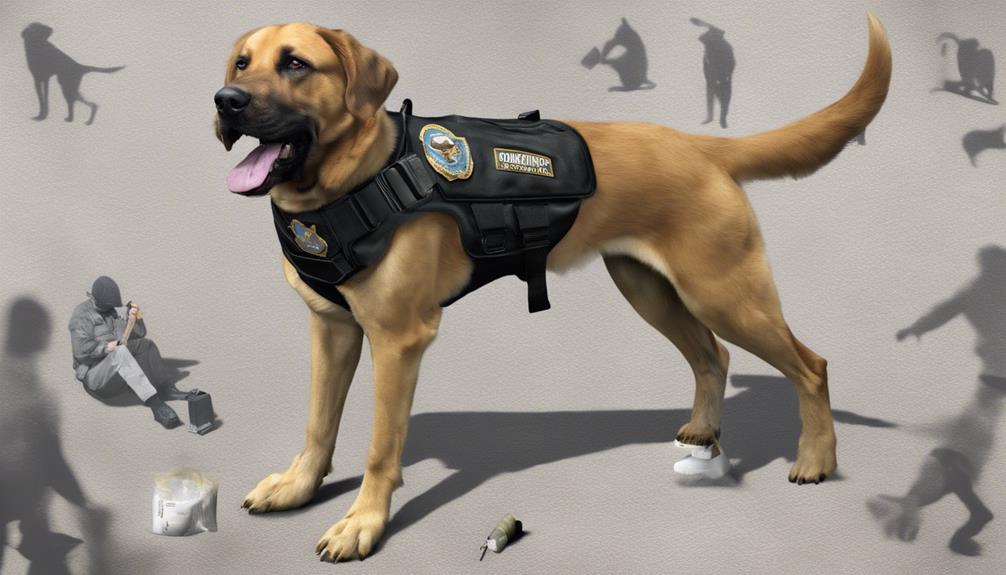
Trained to detect illegal drugs such as cocaine, heroin, and methamphetamine, Narcotics Detection Canine Handlers play an essential role in law enforcement operations by assisting in locating and identifying narcotics during searches. These professionals possess specialized expertise in training and working with detection dogs to guarantee effective detection of illicit substances.
- Training Programs: Narcotics Detection Canine Handlers undergo rigorous training programs that focus on teaching dogs to recognize specific scents associated with various drugs.
- Collaboration with Canine Partners: Handlers work closely with their canine partners to maintain a strong working relationship that enhances the accuracy of drug detection.
- Regular Maintenance: Handlers must consistently train and certify their canine partners to assure the ongoing effectiveness of their detection skills.
- Environment Adaptability: Handlers are skilled at deploying their canine partners in various environments to detect narcotics efficiently.
- Critical Role: These professionals are vital in aiding law enforcement agencies in combating drug trafficking and keeping communities safe.
Canine Health and Wellness Specialist
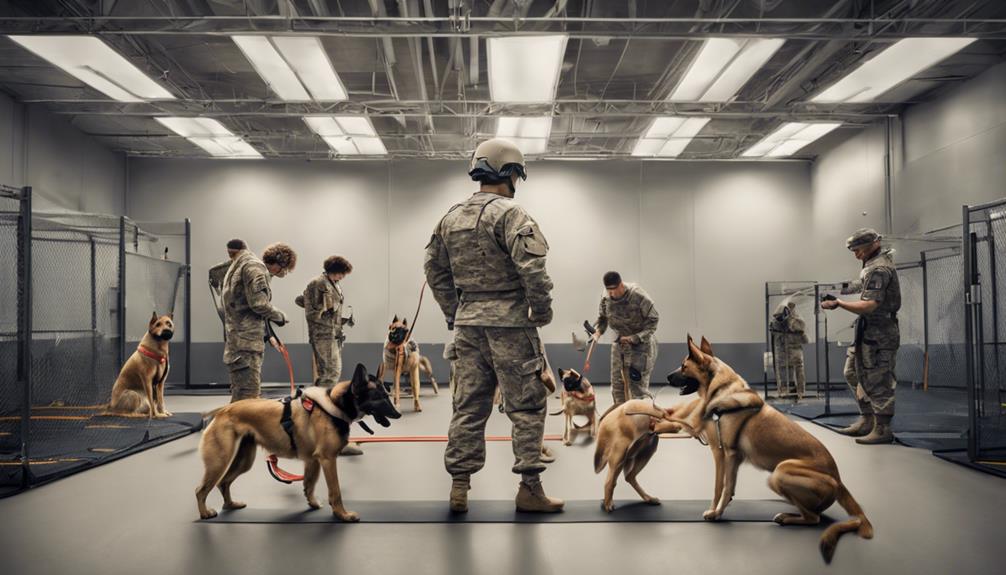
Working alongside Narcotics Detection Canine Handlers, Canine Health and Wellness Specialists focus on maintaining the physical and mental well-being of military working dogs. These specialists ensure that K-9 units receive proper nutrition, exercise, and medical care to perform at their best in their duties. By providing preventive care and working closely with veterinarians, these experts play a vital role in sustaining the overall health and fitness of service dogs. Their attention to detail and expertise contribute greatly to the longevity and effectiveness of military working dogs during various missions.
| Canine Health and Wellness Specialist | Military Working Dogs |
|---|---|
| Focus on physical and mental well-being | Ensure peak performance |
| Provide nutrition, exercise, and medical care | Collaborate with veterinarians |
| Offer preventive care for service dogs | Contribute to endurance and effectiveness |
Canine Health and Wellness Specialists are instrumental in upholding the well-being of these loyal and hardworking animals, ensuring they are prepared for any task at hand.
Advanced Training Techniques Expert
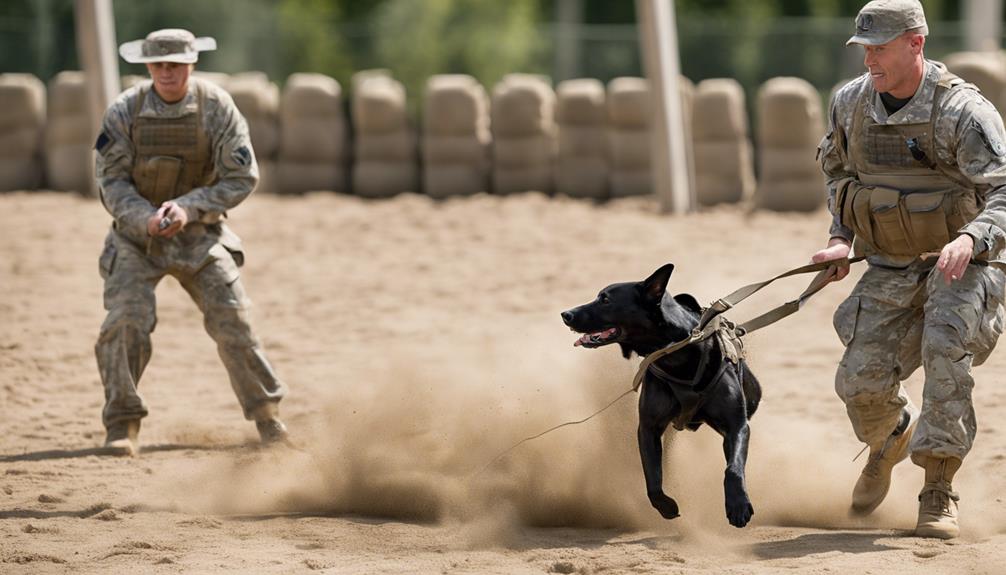
With a focus on refining specialized skills for military working dogs, our expertise as Advanced Training Techniques Experts lies in designing and implementing cutting-edge programs to enhance K-9 unit capabilities. We're dedicated to honing the detection skills and specialized abilities of these elite canines, ensuring they excel in high-stress environments. Our role is pivotal in preparing K-9 teams for complex missions, where their performance can make a significant difference in the field.
Here are five key aspects of our work:
- Developing and executing advanced training programs tailored to enhance military working dogs' skills.
- Utilizing innovative methodologies to elevate detection capabilities and tracking efficiency.
- Enhancing the apprehension skills of K-9 units through specialized training techniques.
- Preparing dogs to operate effectively in high-stress environments and navigate challenging scenarios.
- Contributing to the overall effectiveness and operational readiness of military working dog teams.
Frequently Asked Questions
What Army Jobs Work With Dogs?
We train and handle Military Working Dogs in the Army. Our K-9 units support missions, detect explosives, and serve as non-lethal security measures. We undergo rigorous training to guarantee readiness and effectiveness in our roles.
Who Trains Dogs for the Military?
We, as military dog trainers, are responsible for preparing canines for service. Our methods involve specialized courses, clear signals training, and positive reinforcement techniques. The bond between handlers and dogs is important for achieving best performance in military tasks.
How Much Do Dog Handlers Make in the Army?
To excel as an Army dog handler, one must embody dedication and discipline. Salaries range from $37,000 to $149,465 annually, inclusive of benefits. The compensation package exceeds federal minimum wage and offers valuable bonuses and educational perks.
What Rank Are Dog Handlers in the Army?
In the Army, Dog Handlers hold various ranks, including enlisted Soldiers and commissioned Officers. The rank of a Dog Handler impacts their responsibilities and leadership opportunities. Different ranks come with varying levels of authority and command responsibilities.
Are Army Dog Training Jobs Transferable to Civilian Dog Training Jobs in Colorado Springs?
Yes, Army dog training jobs in Colorado Springs are transferable to civilian dog training jobs. The skills and experience gained in the military are highly valued in the civilian sector. Many veterans have successfully transitioned to careers in dog training in Colorado Springs, leveraging their expertise in working with canines.
Are the Skills from Army Dog Training Jobs Transferable to PetSmart Dog Training Jobs?
The skills acquired from army dog training jobs are highly transferable to exciting PetSmart training jobs. Both require discipline, obedience training, and the ability to work with dogs in diverse settings. Handlers already possess the necessary expertise to excel in PetSmart dog training jobs.
Conclusion
As we wrap up our exploration of the top 10 army dog training jobs, it's clear that the bond between human and canine is a powerful force in the military.
Just like a well-trained dog confidently leading their handler through a dark and dangerous path, these specialized trainers guide their furry companions to success.
They're the unsung heroes behind the scenes, ensuring that our military can rely on their four-legged partners to protect and serve with unwavering loyalty.
